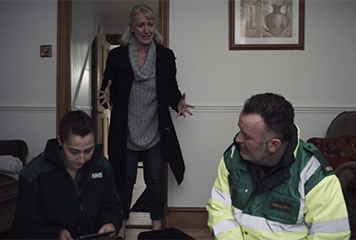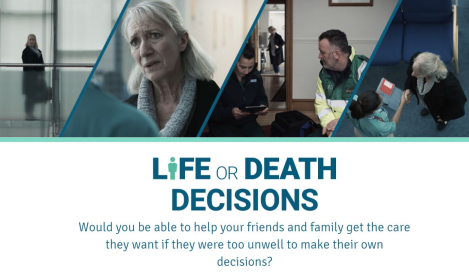“Advance care plans….what is that?” Do you know what that is? Don’t worry if not – a lot of the people I’ve spoken to during my research about their health and future care didn’t know what they were either. Advance care planning (or anticipatory care planning as it is known in Scotland) is care planning for the future. It is thinking about what needs or preferences a person may have in the future in relation to their care. Advance care planning can happen at any time and does not depend on a diagnosis.
My research has looked at how these plans are talked about, created, and used in health and social care practice, particularly at the end of life. Here is a list of five reasons (of many more!) why people may not make an advance care plan and some of the reasons why healthcare professionals want more people to think, talk and document them.
1: It’s not relevant to me

A lot of people think that they don’t need one (yet!), especially if they are currently well. I’ve heard people say they are ‘too young’ for one (even when in their 70s and 80s) or that they’ve never had reason to think that they would need one because of their ‘good’ health. Whilst they can be particularly helpful if someone knows they are dying and they have preferences about the care they want to receive, they can be useful in a wider range of scenarios, including after a sudden accident. So, in theory, they can be relevant to anyone who has a preference about how they are cared for.
2: It’s morbid thinking and talking about dying

Sure, advance care planning may bring up thoughts about dying – like would I want to be resuscitated if my heart stopped? – but that doesn’t mean thinking about this is unnatural or unhelpful. For a variety of reasons, people may find it difficult thinking and talking about their own deaths. However, if you have strong feelings about what you want to happen to you whilst you are still alive or after you have died, it can be useful to have these discussed with others and documented.
3: I don’t know what to include in it

Good point! What do you include in an advance care plan? For example, people may have preferences about the kinds of treatment they do not want or where they want to be cared for. Some advance care plan information and templates help guide you in your thinking. Your doctor will be able to advise you on the types of things to include.
4: What if I want to change it

This was a common concern for participants of my research, especially as many people were using paper forms. People literally held off writing anything because they were worried they could never change it – and it is scary to think you are making a decision that lasts forever. Luckily, advance care plans can be updated, however, it is key that you share the updated versions with those that need to know (e.g. your doctor and family/friends who may be called on to help make decisions about your care if you cannot make those decisions yourself).
5: My family will make the decisions on my behalf

This is a default position for many people, hoping that their family will make decisions for them if they are unable to. And this can work really well in some scenarios and can be the expectations in different families from a range of cultural and social backgrounds. However, there are also many examples of when families have been in this position and have found it difficult to do. Siblings may disagree about whether mum should be on a breathing machine, or a son may worry that he is making the wrong decision for his father, wishing he knew what his father wanted. When working with palliative care professionals, they’ve also told me it can be difficult to know whose view point to consider when there are multiple family members or friends who have different ideas about what should happen. It can be difficult to know what the right thing to do is in this kind of situation.
 See how you will do in a life or death situation in this interactive simulation
There are many valid reasons why a person may not engage with the process of advance care planning. The findings from my research supports a flexible approach to planning, including respecting if a person does not want to plan. Healthcare professionals would like more people to do advance care plans because the plans help clarify a person’s wishes, needs and preferences, and that enables professionals to coordinate care to meet these needs. Advance care plans can include advance directives to refuse treatment and making arrangements for lasting powers of attorney (i.e. someone to make decisions on your behalf if you are unable to).
See how you will do in a life or death situation in this interactive simulation
There are many valid reasons why a person may not engage with the process of advance care planning. The findings from my research supports a flexible approach to planning, including respecting if a person does not want to plan. Healthcare professionals would like more people to do advance care plans because the plans help clarify a person’s wishes, needs and preferences, and that enables professionals to coordinate care to meet these needs. Advance care plans can include advance directives to refuse treatment and making arrangements for lasting powers of attorney (i.e. someone to make decisions on your behalf if you are unable to).
Do you know what you would do in a life or death situation if you found a close friend or family member collapsed on the floor? Try our Life or Death Decisions Interactive to see what you would do and find out what others would do, as well as further information about care planning and decision-making. If you are interested in learning about death and dying, check out our free course on death, dying and grief or our module on death, dying and bereavement. You can learn more about my research and teaching on my Open University profile.


Rate and Review
Rate this article
Review this article
Log into OpenLearn to leave reviews and join in the conversation.
Article reviews